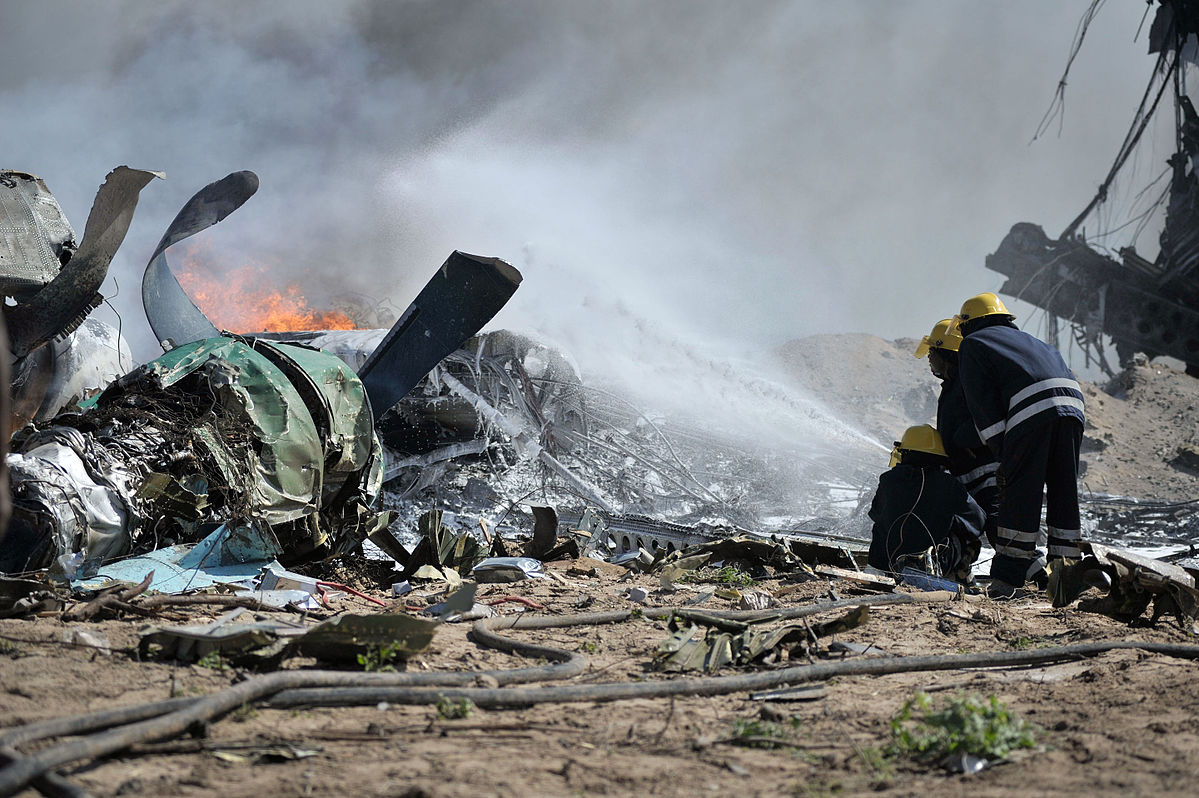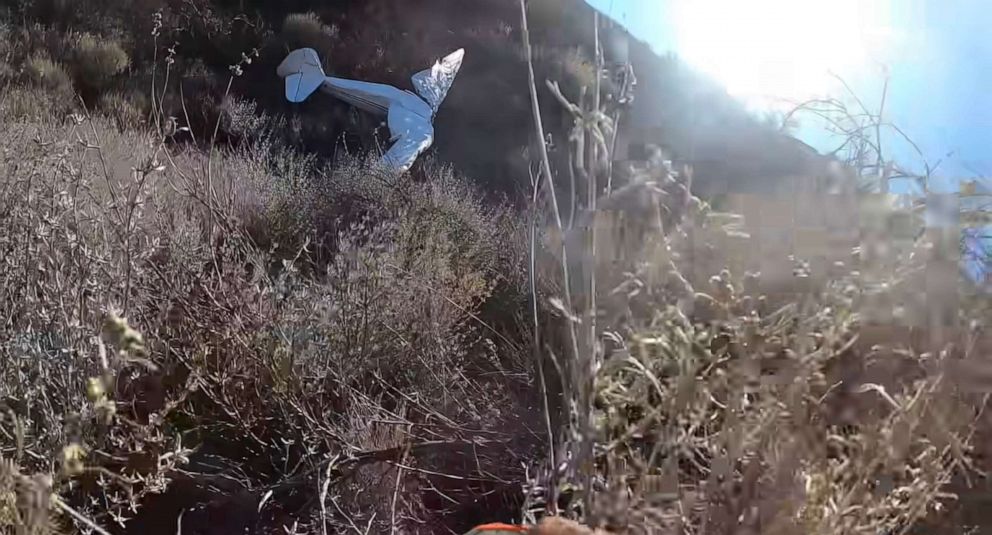The Internet- the place that fulfills the dream of every “unpublished writer” or the “unpublishable one,”- as Christopher Hitchens once memorably said. It is the same place where true daredevils have performed, if not “death-defying,” certainly near-death stunts such as the World Record supersonic freefall. The Internet, a pocket of space of which is YouTube, is a place of vast proportions where the real and the not-so-real sometimes collide. And on such a collision course, we also see YouTubers such as Trevor Jacobs, who, as was later found out, purposefully crashed his aircraft. And that too for YouTube views. A better way to put it would be “for YouTube money.”

Photo: FlugKerl2 | Wikimedia Commons
There’s the glitz and the glam and the fun and the fame. But other troubling factors about Trevor’s case show that the Internet (and it would be impertinent to say that it is exclusive to YouTube) sometimes allows the possibility of crossing over the ethical Line on YouTube.
Let’s draw a parallel: if I have a toy, for instance. Better yet, if I “own” a toy. What does it matter to anyone if I crash the toy or not? After all, I have all the rights over it. What moral considerations should I have to think over, and feel over before I choose to desecrate it? After all, a private plane might be nothing more than your favorite toy. A really expensive one but a toy nonetheless.
Are we allowed to first think and then act in such a way? Let’s dig deeper into Trevor Jackob’s case.
Who is Trevor Jacob? And what was his case?
If you were to read Trevor Jacob’s YouTube description, you would think he is just another person:
“I love sharing adventures, stories, and things I’ve learned, with you.”

But he is not just another person. With 43 videos he’s uploaded on YouTube, he has more than 141,000 subscribers. He is an Olympic athlete and the founder of Adventured.com
Videos of Trevor titled “I learned this from being depressed” and “Suicidal and Depressed Atheletes” show his bravery in expressing his struggles through the melancholic blues of depression. This helped a lot of people who were struggling with the same find solace in his words of encouragement and a general sense of how one could wade through tough times.
And things go awry for Trevor
But Social Media can turn on anyone. No sooner than people thought that the aircraft he claimed to have malfunctioned was staged, the heroic figure of someone who had skateboarded across the USA, someone who had taught himself how to paramotor, etc., was gone, and Trevor came across someone who could put lives of others in jeopardy by letting an aircraft meander in the skies with no controls.
And in doing so, he claimed in his YouTube video, that it was all accidental. As Trevor was flying over the Los Padres National Forest in California, he claimed that the engine had stopped functioning. Following the faulty behavior, his own words in the video read, “Holy s–t. I’m over the mountains and I have an engine out,”
Trevor Jacob parachuting his way out of an aircraft after claiming that the aircraft’s engines had failed.
Then Trevor opted to jump out of the aircraft. He had a parachute on and was able to rescue himself while the plane crashed into a hill. His original YouTube video titled “I crashed my Plane” has garnered over 4.5 million views.
A Few Notable Instances of When YouTubers Crossed the (ethical) Line
Jailed Over a Toothpaste Prank
Kanghua Ren, who is known over the Internet as ReSet, was once sentenced to 2 years of prison in the Spanish courts after he decided that it was alright to “prank” a homeless person by handing over Oreo cookies. Though one might see this as an innocuous act, maybe a benevolent one, but mind you, the “cream” in the Oreo cookies was replaced by “toothpaste.” The court adjourned that Ren had violated the dignity and integrity of the homeless person.
Filming a Person who’d committed suicide
A YouTuber turned wrestler Logan Paul, once uploaded a YouTube video, which he had shot in Aokigahara forest- a forest which is supposed to harbor “Yūrei”- ghosts of Japanese mythology. Well, there might be people who have differing views on whether ghosts exist or not, “netizens” showed unanimous criticism of the fact that Logan’s view had a shot of a person who’d committed suicide after deciding to take his life by “hanging”.

Aokigahara, the suicide forest in Japan where Logan Paul, the YouTuber turned wrestler, shot a video of a person who had committed suicide.
This was perceived to be insensitive on two counts: one- not all people who log into the Internet want to watch a dead person, and two- a matter of paying “respect” to the deceased.
Ethical Considerations in Trevor’s Case of “deliberately crashing an aircraft”
On the 24th of November in 2021, Trevor Jacobs filmed a video of himself in his aircraft whose engine “starts failing” mid-air, and he jumped out of his plane with his parachute in hopes of saving himself. On the surface, it doesn’t sound like a bad thing. But after watching the video, many people were quick to point out all the plot holes in his plan.
The general public was quick to speak about it, and thus after a thorough investigation, he pleaded guilty to crashing his aircraft for YouTube views. This has proven to be unethical, dangerous to the surrounding Environment, and disrespectful as well.
A few details of the aircraft, on Trevor Jacobs
Trevor was flying his ‘Taylorcraft B’ over Santa Barbara County which he intentionally crashed and filmed to post on his social media. As a licensed pilot, one has to know their work ethic to respect the license they have received. This reckless and careless attempt at generating public view is a great felony. When a person is granted a license for anything, they are expected to use the license accurately and never use it to cause damage deliberately.
A Few Ethical Concerns over the Environment
One may have the right to do whatever they want to their property, but they have the right to cause harm to the Environment and any possible form of life using their property. Aircraft, aviation in general, and even poorly constructed airports are known to harm the different forms of life in the area where airports are built.

Whenever an aircraft crashes, there is a huge chance of it causing fire and destroying the surroundings it crashed on. Take the case of the crash of Mig-21 in Hanumangarh, India, which killed a civilian on the ground.
Influencing people in the wrong way
Social Media approaches younger audiences and oftentimes without a great sense of responsibility. Some people view Jacob’s stunt as nothing but a silly little prank. These kinds of reactions are not normal. The video of someone crashing an aircraft solely for views and sponsorship deals should alarm people as this can influence other people to follow the trend of pursuing something similar.
Perspective from General Aviation Safety
The fundamental principle of general aviation security involves guaranteeing the safety of everyone traveling via aircraft. Aviation safety is a significant and delicate subject when taking off. It involves carrying out research to prevent aviation mishaps, educating those involved in the industry as well as the general public about the safety protocol, and designing both aircraft and aviation infrastructure safely.
The rules of professional conduct were violated in the intentional crashing of an aircraft. The felony charges are to 20 years in prison for Trevor Jacobs. Dangerous stunts like the one Trevor pulled off might be adrenaline-pumping as it means you are testing your boundaries.

The Yeti Airlines Flight 691 crash in Pokhara, a valley lodged in between hills, has led to a plummeting of trust in aviation safety in Nepal. The intentional crash of an aircraft like that of Jacob will only add to such scepticism.
The public trust in aviation safety in countries such as Nepal is dwindling due to numerous devastating crashes over the years. These kinds of absurd stunts, particularly in a country like the US, which many countries stand in awe of, make it even harder for the public to trust the aviation industry and board airplanes. If a licensed pilot pulls up acts like the one Jacob did and dares to post it on social platforms and lie about it being an accident, it will tarnish the image of the entire aviation industry to some extent.
What the Federal Aviation Administration (FAA) said
The FAA, in an address directed at Trevor Jacobs, said,
“You demonstrated a lack of care, judgment, and responsibility by choosing to jump out of an aircraft solely so you could record the footage of the crash.”
It further read:
“Your egregious and intentional actions on these dates indicate that you presently lack the degree of care, judgment, and responsibility required of a certificate holder,“
“During this flight, you opened the left side pilot door before you claimed the engine had failed,”
the FAA wrote in their consternation over the event where he had made no effort to contact air traffic control in case of an emergency.
Is desensitization over the Internet a Concern?
Although one can stand on either side of the argument of whether what Trevor did was unethical and immoral, there is no guarantee that some percentage of people won’t be influenced by what he did and won’t try what he did again.
Trevor did not only destroy an aircraft but also posed a threat to the Environment by damaging the flora and fauna of the crash site. Fortunately, his aircraft had no human fatality, but there were chances of it starting a wildfire due to how dry the bushes were was enormous- and this in a time when there’s a global rise in wildfires across forests.

It has been argued plausibly that Social media helps to perpetuate the stigma of mental illness by portraying people with psychiatric diseases in exaggerated, erroneous, and humorous ways and by giving false information about mental illness. Sensationalizing dangerous acts for online content creates psychological and social effects, especially on the younger generation.
The Verdict
All of the concerns we’ve raised above have been put forward in one way or the above- maybe by other YouTubers and most definitely by lawyers working on the case. As a result, the 29-year-old faces a maximum of 20 years in prison.
This is quite a fall for Trevor Jacobs, who participated in the 2014 Winter Olympics in Sochi, Russia. He had competed for Team USA in snowboarding and was able to secure ninth place in men’s snowboard cross back then.
He’s pleaded guilty, and this is a step forward- we have a person who is trying to owe up to his actions. Maybe it is the fear of facing a longer sentence if he doesn’t; maybe it is an act of realization of the potential of how horrific the act might have been if a human casualty had been involved.

He rose up from depression. We can only hope he does the same after his backlash and whatever sentence is meted out to him. Social Media can be unforgiving even after people have deeply repented for their wrongdoings. We hope for a better future and a more responsible one. And one with redemption.
A Final Say
As content creators, everyone should think about the responsibility that having followers comes with. The innocuous, bordering on dangerous acts made for online content consumption may sometimes create psychological and social impacts on people as well. The wanting to fit into a culture may sometimes drive people to try out the dangerous acts they see online. This kind of feeling is explainable as a need to fit might be a universal one, but weighing over their negative consequences should be, if it already is not, universal too.
